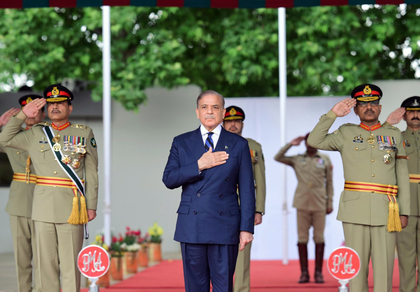Pakistan-linked networks connected to global arms smuggling: Report
By IANS | Updated: November 3, 2025 21:15 IST2025-11-03T21:12:22+5:302025-11-03T21:15:20+5:30
Islamabad, Nov 3 Pakistan-based entities have been linked to arms trafficking networks extending beyond India and Afghanistan - ...

Pakistan-linked networks connected to global arms smuggling: Report
Islamabad, Nov 3 Pakistan-based entities have been linked to arms trafficking networks extending beyond India and Afghanistan - from Iranian arms transfer to Yemen's Houthis to wider black markets across the Middle East and Africa, a report cited on Monday.
Citing findings from investigative reports and official charges in the United States and Europe, it stated that Pakistani nationals participated in unlawful exports of anti-aircraft ammunition and drone technology, bolstering Pakistan’s global reputation as a logistics and facilitation hub for arms smuggling.
“The recent 40-year prison sentence handed down by a US court to Pakistani national Muhammad Pahlawan for smuggling Iranian weapons to Yemen’s Houthi insurgents has cast a glaring spotlight on the persistent involvement of Pakistani actors in international arms trafficking and criminal enterprises. Pahlawan’s conviction is not an isolated incident but rather a manifestation of a broader trend, reflecting Pakistan’s entanglement in regional and global illicit arms flows, often with grave security implications for the wider world,” a report in 'Asian News Post' detailed.
According to the report, Muhammad Pahlawan, the Pakistani citizen, was sentenced to 40 years by a US federal court in Virginia on charges of conspiring to provide material support to terrorists, violating weapons of mass destruction controls, and illegally transporting advanced conventional arms.
“The US Justice Department revealed that Pahlawan captained a fishing vessel used to move sophisticated Iranian ballistic missile components, anti-ship missile parts, and warheads to the Houthi rebels in Yemen. This operation, intercepted in the Arabian Sea in January 2024, tragically resulted in the deaths of two US Navy SEALs during the boarding action. Crew testimonies revealed many were deceived about their participation, highlighting the transnational, clandestine, and often coercive nature of such trafficking networks,” it mentioned.
The report noted that in recent years, the modus operandi of Pakistani arms traffickers has evolved. From large-scale trucking operations, it said, the network now employs methods such as drone drops and maritime transfers and covert border crossings, often managed by organised criminal networks with overseas links.
Historical investigations, the report said, have documented the role of Pakistan’s Inter-Services Intelligence (ISI) and military-backed syndicates in both arming foreign proxies and managing lucrative smuggling chains for profit and strategic influence. Some analysts argue that denial and inaction by law enforcement have enabled criminal actors and militant suppliers to operate with significant impunity, enhancing the resilience and expanding the footprint of these networks.
“So long as criminal and state actors in Pakistan possess the motive, opportunity, and network to facilitate illicit arms flows, regional and global security will remain threatened. Whether supplying weapons to state clients, proxies, sectarian groups, or criminal syndicates, Pakistan’s entanglement in arms smuggling is both a historical constant and a present danger,” the report noted.
Disclaimer: This post has been auto-published from an agency feed without any modifications to the text and has not been reviewed by an editor
Open in app